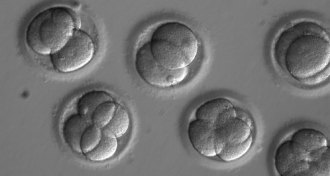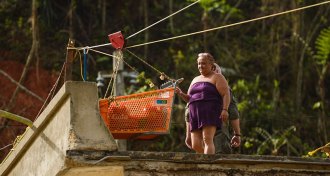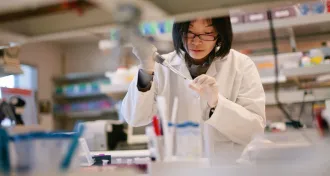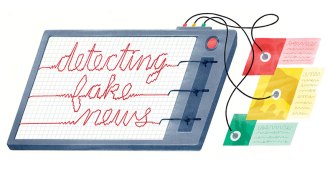Science & Society
Sign up for our newsletter
We summarize the week's scientific breakthroughs every Thursday.
-
 Genetics
GeneticsResearchers say CRISPR edits to a human embryo worked. But critics still doubt it
Researchers say that they have confirmed CRISPR/Cas9 edits of a heart disease–causing version of a gene, but critics still have doubts.
-
 Science & Society
Science & SocietyFor popularity on Twitter, partisanship pays
Pundits claim that we’re all living in political echo chambers. A new study shows that, on Twitter at least, they’re right.
-
 Health & Medicine
Health & MedicineHurricane Maria’s death toll in Puerto Rico topped 1,100, a new study says
According to data from the Puerto Rico vital statistics system, Hurricane Maria killed an estimated 1,139 people.
-
 Science & Society
Science & SocietyWomen and men get research grants at equal rates — if women apply in the first place
When women get research funding, they’ll stay funded as long as their male counterparts. But getting to the top of that heap is a challenge.
-
 Genetics
GeneticsMost Americans think it’s OK to tweak a baby’s genes to prevent disease
Americans generally favor tweaking a baby’s genes to reduce the chance of getting a disease, but think boosting intelligence is a step too far.
-
 Science & Society
Science & SocietyPeople are bad at spotting fake news. Can computer programs do better?
Fake news–finding algorithms could someday make up the front lines of online fact checking.
-
 Science & Society
Science & SocietyWhat does fake news look like to you?
Editor in Chief Nancy Shute discusses the importance of being able to illustrate science visually.
By Nancy Shute -
 Genetics
Genetics50 years ago, scientists took baby steps toward selecting sex
In 1968, scientists figured out how to determine the sex of rabbit embryos.
-
 Health & Medicine
Health & Medicine‘The Poisoned City’ chronicles Flint’s water crisis
A new book examines how lead ended up in Flint’s water and resulted in a prolonged public health disaster.
-
 Science & Society
Science & SocietyIn research, detours are a key part of discovery
Editor in Chief Nancy Shute discusses the scientific process and the often contradictory research about Alzheimer's disease.
By Nancy Shute -
 Science & Society
Science & SocietyMost Americans think funding science pays off
About 80 percent of U.S. adults say that federal spending on scientific and medical research provides value in the long run, a new survey finds.
-
 Genetics
GeneticsThe study of human heredity got its start in insane asylums
‘Genetics in the Madhouse’ reveals how human heredity research began as a statistical science in 19th century insane asylums.
By Bruce Bower